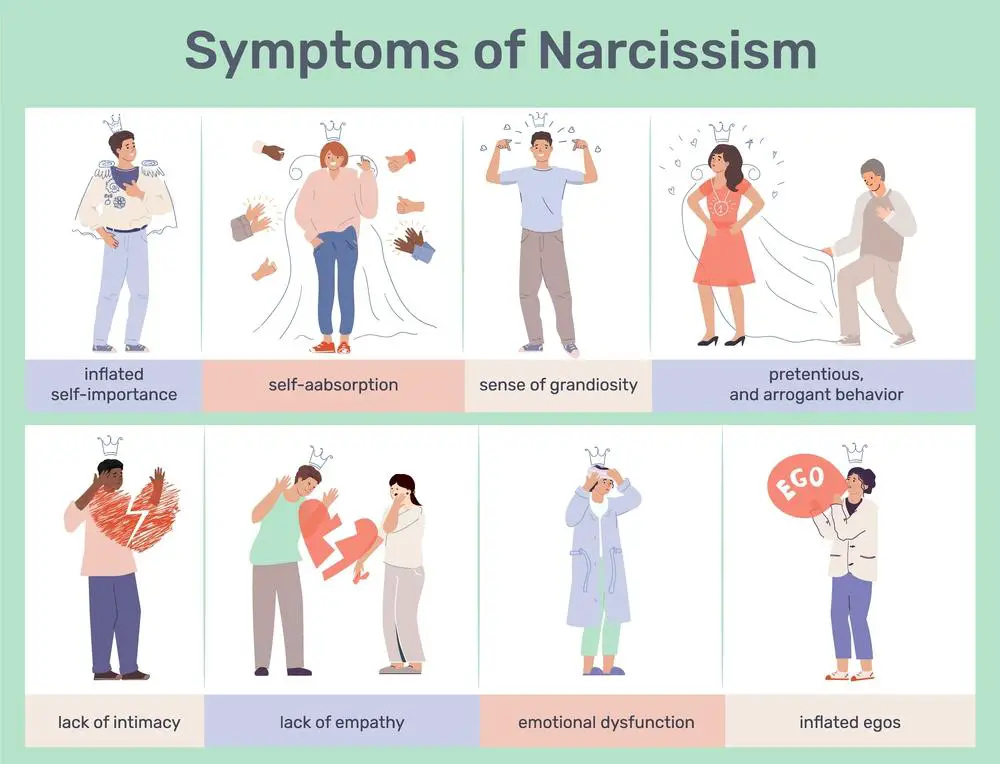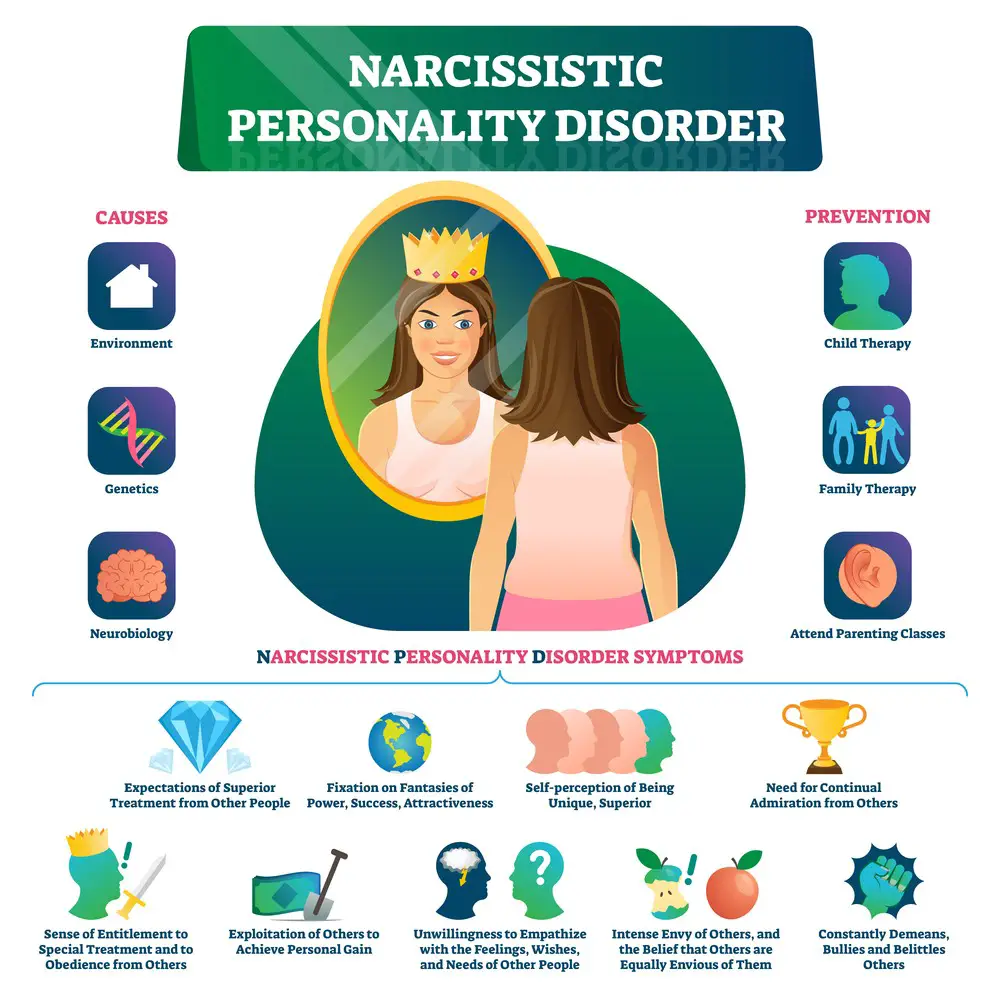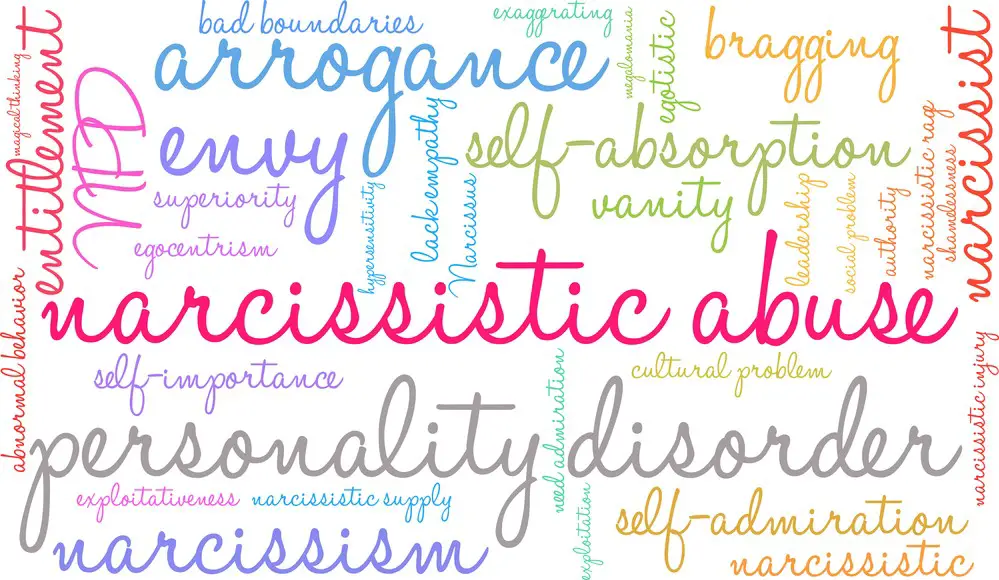As a BetterHelp affiliate, we receive compensation from BetterHelp if you purchase products or services through the links provided
Have you ever wondered if certain challenging behaviors in your relationship might be a sign of something more? Recognizing the traits of a narcissistic partner isn’t always straightforward, especially when emotions and history are deeply entwined in your marriage. A spouse with narcissistic tendencies may exhibit a pattern of self-centeredness, require excessive admiration, and lack empathy, which can lead to a one-sided relationship dynamic.
Understanding whether your husband has narcissistic qualities can be daunting. When faced with such a complex personality type, it’s common to question your perceptions. Before jumping to conclusions, it’s essential to familiarize yourself with the characteristics of narcissistic personality disorder, a condition characterized by a persistent pattern of grandiosity, a need for admiration, and a lack of empathy. Identifying these traits requires a critical look at patterns of behavior over time.
Knowing how to communicate effectively and manage conflicts can make a substantial difference when contemplating your well-being and the health of your relationship. Professional perspectives suggest setting boundaries and seeking support if you find yourself overwhelmed. Whether it’s evaluating the daily impact on your life, considering parenting strategies with a narcissistic partner, or contemplating the future of your relationship, it’s vital to proceed with a clear mind and supportive resources.
Key Takeaways
- Identifying narcissism requires understanding specific traits and patterns of behavior.
- Effective communication and setting boundaries are crucial in a relationship with a narcissistic partner.
- Seeking professional support can be a valuable step in managing your well-being.
Understanding Narcissism
Before diving into the quizzes that might indicate narcissistic traits, it’s crucial to understand what narcissism entails. The characteristics and implications of this personality disorder shape behavior and impact relationships.
Defining Narcissistic Personality Disorder
Narcissistic Personality Disorder (NPD) is a mental health condition characterized by a long-term pattern of exaggerated self-importance, a deep need for excessive attention and admiration, and a lack of empathy for others. The Diagnostic and Statistical Manual of Mental Disorders (DSM-5) classifies it as a personality disorder. Individuals with NPD often showcase:
- Grandiosity: An unrealistic sense of superiority, labeled as a fantasy of power, beauty, success, or ideal love.
- Entitlement: A belief that one deserves special treatment or unwavering compliance with one’s expectations.
Components of Narcissism
Narcissism isn’t a one-size-fits-all personality trait; it’s a complex mix that can manifest differently in individuals. Key components include:
- Persistent patterns of grandiose behavior or fantasies.
- Constant need for admiration and attention.
- Interpersonal troubles stemming from a sense of entitlement and exploiting relationships.
Note: Having one or two traits does not necessarily mean someone has NPD, which mental health professionals diagnose.
Narcissism vs. Confidence
It’s easy to mistake high self-esteem for narcissism, but they aren’t the same:
- Confidence is healthy self-esteem and belief in one’s abilities while being considerate of others.
- Narcissism involves a sense of superiority and often comes with disregarding other people’s feelings.
Key Takeaway: Understand that although narcissism includes self-focused behaviors, it’s a diagnosable condition that goes deeper than just being confident or self-assured. If you’re worried about narcissistic traits in your relationship, consider seeking professional advice.
 Recognizing Narcissistic Traits
Recognizing Narcissistic Traits
In exploring the traits of narcissism in a partner, you’ll come across behaviors and tendencies that can shape relationship dynamics. It’s essential to identify these as they’re not always obvious.
Common Behaviors of a Narcissist
- Grandiosity: You might notice an overwhelming sense of self-importance or a belief that they’re superior or unique.
- Seeking Admiration: A constant need for excessive admiration could be a red flag.
Narcissists often display an arrogant attitude and behavior, expecting special treatment. If your husband often seems to put his needs and desires above others, it could be indicative of these traits.
Key takeaway: If your husband exhibits grandiosity and a persistent quest for admiration, these could be signs of narcissistic behavior.
Narcissistic Tendencies in Relationships
Is your husband’s behavior affecting your relationship?
- Lack of Empathy: A genuine concern for your feelings and needs might be missing.
- Manipulative Tactics: Narcissists can be charming yet may use this to influence or control others.
In a relationship with a narcissist, your needs could feel neglected, and there might be a pattern of manipulative behavior aimed at maintaining an upper hand.
Key takeaway: A significant sign of narcissism in relationships is a visible lack of empathy and possible manipulative behavior.
Emotional Impact of Narcissistic Traits
Living with a narcissist can have a deep emotional impact:
- You may feel continuously undervalued or dismissed.
- Your emotional well-being might take a back seat to your partner’s excessive need for admiration and attention.
Narcissistic traits can lead to a one-sided emotional dynamic where your feelings are often ignored or diminished.
Key takeaway: It’s vital to recognize the emotional cost of narcissistic traits in a relationship, as they can profoundly affect your self-esteem and emotional health.

Signs You’re Married to a Narcissist
Recognizing the signs of a narcissistic partner is crucial in understanding the dynamics of your marriage and well-being.
Interactions and Conversations
- You feel unheard: In your conversations, if your husband often talks at you, not with you, and dismisses your feelings, these are red flags.
- Superior attitude: Does he tend to belittle your opinions or achievements?
Key Takeaway: Genuine two-way conversation is rare with a narcissistic partner.
Control and Manipulation Tactics
- Gaslighting: You may notice a pattern where your husband invalidates your reality, insisting that certain events never happened.
- Conditional affection: Love and attention seem dependent on his approval of your actions.
Key Takeaway: Narcissists often use manipulation to maintain control in relationships.
The Role of Empathy
- Lack of empathy: Watch for instances where he appears indifferent to your emotions or the feelings of others.
- Self-centric: Does he turn every situation into one about his issues or feelings, ignoring yours?
Key Takeaway: A spouse’s consistent lack of empathy can be indicative of narcissistic traits.
 The Impact on Personal Well-Being
The Impact on Personal Well-Being
When you’re questioning whether your partner may be a narcissist, it’s essential to consider the profound impact this might have on your well-being, particularly on your mental health, sense of self-worth, and the ways you cope with potential abuse within the relationship.
Mental Health Considerations
Being in a relationship with a narcissist can place a significant strain on your mental health. You may experience:
- Chronic feelings of anxiety or depression
- Difficulty sleeping or changes in your appetite
- Lowered resilience to stress
- Strong feelings of guilt or confusion due to gaslighting tactics
Key Takeaway: Protecting your mental health is crucial, and recognizing these signs can prompt you to seek the help and support you need.
Self-Worth and Narcissistic Relationships
A narcissistic partner may directly impact your sense of self-worth due to their tendency to offer praise and criticism unpredictably. Aspects you might notice are:
- Frequent self-doubt about decisions and abilities
- Seeking constant validation from your partner or others
- Feeling unworthy of love or respect
Key Takeaway: Building and maintaining a healthy self-worth is essential, especially in these challenging relationship dynamics.
 Coping with Narcissistic Abuse
Coping with Narcissistic Abuse
Narcissistic abuse can be subtle or overt, but it’s always harmful. Here are some strategies to cope with this abuse:
- Establishing and enforcing personal boundaries
- Seeking support from friends, family, or a professional therapist
- Engaging in self-care practices that reaffirm your value and identity
- Learning about narcissism to better understand the behavior you’re facing
Key Takeaway: Coping strategies are vital for your well-being and can empower you to make informed decisions about your relationship.
Professional Perspectives
Understanding narcissism through the lens of mental health professionals is vital. They provide clarity and guidance that goes beyond self-assessment quizzes.
 Therapy and Narcissism
Therapy and Narcissism
When exploring narcissistic traits, a therapist can offer a nuanced perspective. Narcissism is a complex personality pattern, and therapists are trained to identify the subtleties associated with it. Here are a few key insights:
- Therapy sessions can reveal narcissistic tendencies that may not be visible in everyday interactions.
- A clinical diagnosis should only be made by a qualified mental health professional.
Key Takeaway: If you’re concerned about narcissistic traits in your husband, discussing your observations with a therapist could provide valuable insights.
When to Seek Professional Help
Determining when to seek assistance from a mental health professional is crucial. Here’s what you need to consider:
- When your husband’s behavior consistently impacts your well-being, it’s time to find a therapist.
- A mental health professional can offer support and strategies for dealing with selfish behavior.
Key Takeaway: Seek professional help if your partner’s behavior begins to harm your life or mental health.
Communication Strategies
Effective communication is the cornerstone of any strong relationship. When addressing concerns about narcissism in a partnership, it’s crucial to approach conversations with clarity and to manage interactions with care.
Opening Up the Conversation
Start talking with your partner by choosing a calm and comfortable environment. This can make a significant difference in how the conversation flows.
- Choose the right time: Wait for a moment when you’re both free of other distractions.
- Use “I” statements: Express your feelings without assigning blame, e.g., “I feel undervalued when…”
Key takeaway: Initiating the dialogue with thoughtfulness sets a positive tone.

Setting Boundaries and Expectations
Clear boundaries help safeguard your well-being in any relationship.
- Be explicit: Clearly explain what behaviors are acceptable and which aren’t.
- Consistency is key: Once set, stick to your boundaries to show their importance.
Key takeaway: Boundaries support a healthy dynamic where your needs are respected.
Handling Criticism and Blame
Responding to criticism and blame with poise is challenging, but it’s essential for constructive dialogue.
- Acknowledge your feelings: It’s okay to say, “This comment hurt me because…”
- Seek understanding: Ask questions to get to the foundation of the criticism.
Key takeaway: Treating criticism with curiosity rather than defensiveness opens the door to deeper understanding.
Parenting with a Narcissistic Partner
When dealing with a narcissistic partner, parenting can be a complex journey filled with unique challenges. Your child’s well-being and the parent-child dynamic can be deeply influenced.
Effects on Children
Children raised by a narcissistic parent can experience a range of emotions and developmental issues. Your child might:
- Struggle with self-esteem: Constantly seeking approval from the narcissistic parent.
- Feel unimportant: Due to the parent’s self-absorption, the child might feel neglected.
- Model problematic behaviors, Such as lack of empathy or excessive self-importance.
Key Takeaway: Monitor your child’s behavior and self-perception; these can be early indicators of the impact.
Protecting Children’s Mental Health
Prioritizing your child’s mental health is crucial. Here are a few strategies to consider:
- Provide unconditional love: Ensure they feel valued for who they are, not what they do.
- Foster open communication: Encourage your child to express their feelings without fear of judgment.
- Seek professional help if needed: A counselor can offer your child support and coping mechanisms.
Key Takeaway: Steady emotional support is vital for your child’s mental and emotional development.
Co-Parenting Challenges
Navigating co-parenting with a narcissistic partner can feel like you’re in rough waters. Keep these tips in mind:
- Set firm boundaries: This helps create a stable environment for your child.
- Document interactions: Record details of conversations regarding parenting decisions.
- Stay calm and consistent: Reducing conflict around the child is imperative for their sense of security.
Key Takeaway: Co-parenting successfully with a narcissistic partner hinges on clear communication and boundary-setting.
Dealing with Conflicts and Arguments
When your partner is a narcissist, the usual rules for resolving disagreements tend to go out the window. Here, you’ll get to grips with how narcissists react during conflicts and find out strategies to untangle the tension.
Understanding the Narcissist’s Reaction
Narcissists often have difficulty handling any criticism or perceived slights. During conflicts, you might notice:
- Defensiveness: A swift gear-shift to explain why they’re not at fault.
- Projection: Accusing you of the very faults or actions they’re displaying.
- Gaslighting: Attempts to make you doubt your version of events or feelings.
It’s essential to recognize these patterns as tactics, not truths; they’re about maintaining control, not resolving the issue.
Key Takeaway: Be mindful of common narcissistic responses to prepare yourself emotionally for the discussions ahead.
Strategies for Resolving Conflict
Navigating arguments with a narcissist requires a different set of approaches:
- Stay Calm: Keep your cool, even when the temperature in the room seems to rise.
- Use “I” Statements: Focus on how the behavior affects you, rather than accusing your partner.
- Set Boundaries: Be clear on what is acceptable and stand firm.
- Choose Your Battles: Not every disagreement needs a resolution; sometimes, it’s about preserving your energy.
Remember, it’s not just about getting through one argument but about finding a sustainable way to communicate in your relationship.
Key Takeaway: Approaching conflict with clarity and calmness can help find common ground, even when it seems particularly challenging.
When to Accept and Move On
Sometimes, despite our best efforts, the reality is that not every battle in a relationship with a narcissist is worth fighting. It’s crucial to recognize when it’s time to prioritize your mental health and seek a happier future.
Recognizing an Unwinnable Battle
You might feel like you’re on a hamster wheel, exhausting yourself trying to improve the relationship, yet getting nowhere. A key sign that you’re facing an unwinnable battle is when you see a consistent pattern of:
- Lack of empathy: Your partner repeatedly fails to recognize or validate your feelings.
- Manipulation: You often find yourself coerced into situations that only benefit your partner.
Key Takeaway: If these patterns are persistent, it may signal that the relationship is not conducive to your well-being.
Building a Support System
As you acknowledge these challenges, it’s important not to go it alone. Build a robust support system that can:
- Offer emotional reinforcement.
- Provide practical advice and resources.
- Validate your experiences without judgment.
Key Takeaway: Surrounding yourself with people who care for your well-being can make a significant difference as you navigate this personal challenge.
Deciding to Leave the Relationship
This decision is profound and often a last resort, but sometimes, it’s the healthiest path forward. Steps to consider include:
- Weighing the impact on your mental health.
- Evaluating your happiness and growth.
- Considering the feasibility and logistics of living independently.
Key Takeaway: If your relationship severely hampers your quality of life, moving on could be a step toward reclaiming your happiness.
Building a Healthy Life Post-Narcissism
After recognizing the impact of narcissism on your life, it’s essential to focus on healing and growth. Let’s explore how you can reclaim your sense of self, build stronger relationships, and establish a nurturing environment.
Rediscovering Personal Identity
Rediscovering who you are after a relationship with a narcissist can be liberating. It’s like finding fresh colors to paint your life’s canvas. Here’s how to start:
- Reflect on Your Values: List what truly matters to you, not what someone else has dictated.
- Pursue Interests: Don your explorer’s hat and try new hobbies or activities that spark your curiosity.
After diving into this personal journey, you’ll find that your identity grows stronger and more defined.
Key takeaway: This is your time to shine with your light, not someone else’s reflection.
Starting Fresh in Relationships
Building new relationships after experiencing narcissism involves setting solid boundaries and trusting your instincts:
- Boundaries: Clearly outline what you expect from others; respect and honesty should be at the core.
- Trust Your Gut: If someone’s behavior brings back uncomfortable echoes of the past, it’s okay to step back.
Embrace the idea of slow and steady wins the race when forming bonds with others. You are shaping a social circle that uplifts rather than undermines. Key takeaway: Healthy relationships are built on mutual respect, so keep that as your guiding principle.
Creating a Supportive Environment
A nourishing environment is crucial for ongoing recovery and well-being. Here’s how you can create one:
- Choose Your Company Wisely: Surround yourself with people who reinforce your value and respect your journey.
- Create Physical Space: Your home should be a sanctuary. Fill it with objects that bring you comfort and joy.
A supportive environment acts as a buffer against the outside world and a foundation for your inner peace.
Key takeaway: Your environment should echo the positivity and growth you nurture.
Frequently Asked Questions
In this section, you’ll find some common concerns addressed regarding whether your partner might exhibit narcissistic traits. Each question sheds light on particular behaviors and their implications in a relationship with a narcissist.
How can you identify covert narcissistic behavior in a spouse?
Covert narcissists often mask their self-centered behavior with shyness or sensitivity. You might notice your spouse is hypersensitive to criticism, or they might play the victim to garner sympathy. Key takeaway: Be mindful of subtle signs like a persistent sense of entitlement or passive-aggression.
What are the most common traits of a narcissistic partner?
A narcissistic partner may display an inflated sense of self-importance, lack empathy, and have a high need for admiration. They might also be preoccupied with fantasies about success, power, or attractiveness. Watch for patterns of manipulative or controlling behavior, which are telltale traits.
Could certain behaviors indicate that I’m dealing with a narcissist, or are they typical relationship issues?
It’s essential to differentiate between selfish behavior and typical relationship challenges. Narcissists often refuse to acknowledge or discuss problems. If your spouse shows a pattern of avoiding accountability and dismissing your feelings, these could be red flags.
What are the key signs to look for if you suspect your partner is a narcissist?
Look for consistent behaviors such as lacking empathy, exploiting others for personal gain, or needing constant praise. An absence of genuine interest in your life and well-being can also be indicative. It’s essential to trust your instincts if these signs persist.
How does being in a relationship with a narcissist affect one’s emotional well-being?
Being with a narcissist can be profoundly taxing on your emotional health. Feelings of being undervalued, constant self-doubt, and emotional withdrawal are common effects. Remember, prioritizing your emotional health is a necessity, not a luxury.
What are effective strategies for interacting with a narcissistic partner?
Handling a relationship with a narcissistic partner requires solid boundaries and clear communication. Avoid power struggles and practice self-care. You can also seek support from a therapist who can provide strategies tailored to your situation. Remember, your well-being should always come first.
Meet Jacob Maslow: A Journey Through Adversity
A Glimpse Into My World My name is Jacob Maslow, and my life story is one of endurance, strength, and learning. For years, I’ve navigated the turbulent waters of being married to a narcissist. This journey has profoundly shaped who I am and my approach to life and writing.
Dealing with Narcissism and Legal Battles My experience with my ex-spouse epitomizes the challenges of dealing with severe narcissism. As my ex-partner’s beauty began to fade, her narcissistic tendencies intensified, leading to a complete alienation from our children. Despite court orders for shared custody, she has consistently refused to allow me any form of communication with our two minor children. This has resulted in an ongoing legal battle, starkly contrasting the close relationship we maintained post-separation.
Mental Health: A Personal and Professional Focus Mental health is a subject close to my heart, both personally and professionally. To manage my mental well-being, I take Lexapro and am a seasoned participant in therapy, recently joining BetterHelp. This personal experience fuels my passion for writing about mental health and narcissism, aiming to support those facing similar challenges.
Finding Solace and Clarity In my quest for clarity and peace, I’ve found solace in long walks, a simple yet powerful way to clear my mind amidst the chaos.
Supporting Others Through Legal Expertise My legal website reflects another aspect of my mission: helping others who struggle with non-compliant spouses and the weaponization of children in custody disputes. Drawing from my experiences, I guide and support those navigating these complex situations.
A Sudden Change: The Impact on My Life The abrupt end to my close relationship with my children just nine months ago has been a significant blow to my mental health. This experience underscores the unpredictable and often devastating nature of dealing with a narcissistic partner.
Final Thoughts Through my articles, I aim to empower and assist those wrestling with mental health issues and the intricacies of dealing with narcissistic partners. Remember, overcoming mental health challenges is possible, and I’m here to help guide you on this journey.

- 3 Ways Wearing a Hat Can Help Lower Your Stress Levels - April 19, 2025
- Breaking the Silence: Why Men’s Mental Health Matters More Than Ever - April 15, 2025
- How to Transform a Home’s Patio Space into a Relaxing Space - March 23, 2025
This site contains affiliate links to products. We will receive a commission for purchases made through these links.



 Recognizing Narcissistic Traits
Recognizing Narcissistic Traits The Impact on Personal Well-Being
The Impact on Personal Well-Being Coping with Narcissistic Abuse
Coping with Narcissistic Abuse Therapy and Narcissism
Therapy and Narcissism
